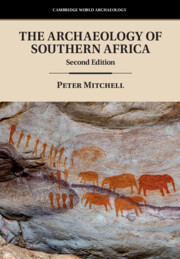Book contents
- Frontmatter
- Contents
- List of Figures
- List of Tables
- Acknowledgments
- 1 Introduction
- 2 Frameworks
- 3 Contexts
- 4 Origins
- 5 A Cognitive Revolution
- 6 Hunter-Gatherers of the Late Pleistocene
- 7 Archaeologies of the Pleistocene/Holocene Transition
- 8 Hunting, Gathering, Intensifying: Forager Histories in the Holocene before 2000bp
- 9 Taking Stock: Herders and Hunter-Gatherers
- 10 Farmers and Foragers: the First Millennium
- 11 Forming States: the Zimbabwe Culture and its Neighbours
- 12 Recent Farmers and Hunter-Gatherers in Southernmost Africa
- 13 Colonisation, Conquest, Resistance
- 14 Perspectives and Prospects
- Glossary
- References
- Index
4 - Origins
Published online by Cambridge University Press: 15 May 2024
- Frontmatter
- Contents
- List of Figures
- List of Tables
- Acknowledgments
- 1 Introduction
- 2 Frameworks
- 3 Contexts
- 4 Origins
- 5 A Cognitive Revolution
- 6 Hunter-Gatherers of the Late Pleistocene
- 7 Archaeologies of the Pleistocene/Holocene Transition
- 8 Hunting, Gathering, Intensifying: Forager Histories in the Holocene before 2000bp
- 9 Taking Stock: Herders and Hunter-Gatherers
- 10 Farmers and Foragers: the First Millennium
- 11 Forming States: the Zimbabwe Culture and its Neighbours
- 12 Recent Farmers and Hunter-Gatherers in Southernmost Africa
- 13 Colonisation, Conquest, Resistance
- 14 Perspectives and Prospects
- Glossary
- References
- Index
Summary
Ranging in date from ~3 mya to ~250 kya, this chapter examines the palaeontological and archaeological evidence for hominin evolution from the late Pliocene to the late Middle Pleistocene. It discusses southern Africa’s main fossil hominin sites, emphasising discoveries from the Cradle of Humankind since 2000, including Australopithecus prometheus, Australopithecus sediba, and Homo naledi. Further afield, attention is directed to the significance of work at sites like Wonderwerk and its expansion into long-neglected areas like the Eastern Cape. Key issues discussed include the problems created by continuing to use Linnaean taxonomy; identifying which hominin(s) made stone tools at any one time; the ecology and diet of individual hominin taxa; the role of tools (including fire) in hominin adaptations; the importance of understanding formation processes at both site and landscape scales; and transformations in material culture, including more sophisticated approaches for analysing lithic assemblages and new work on the transition to the Middle Stone Age. For all these topics, comparisons are drawn where relevant with East Africa and other parts of the world.
Keywords
- Type
- Chapter
- Information
- The Archaeology of Southern Africa , pp. 53 - 84Publisher: Cambridge University PressPrint publication year: 2024



